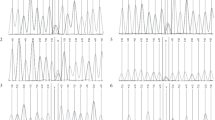Abstract
Single-strand conformational polymorphism (SSCP) and direct sequencing were used to confirm or deny carrier status in three families with ornithine transcarbamylase (OTC) enzyme deficiency. Two male probands with “late onset” OTC deficiency, whose “private” mutations were previously characterized, inherited the mutations form their heterozygous mothers. One of the heterozygous mothers had a false negative allopurinol test. Three female siblings of the two male probands were tested, one proved to be a carrier of the respective mutation while the other two were found to have normal alleles. In the third family, the proband was a female with “late onset” presentation of OTC deficiency. We found a new point mutation in this girl consisting of a guanine-tocytosine transversion at nucleotide 520 resulting in a substitution of proline for alanine at amino acid 142 of the mature OTC protein. We confirmed that this mutation occurred spontaneously and that neither of the two parents carries this mutation. We conclude that SSCP, in conjunction with direct sequencing, is a useful technique that can be practically applied for carrier testing in families with OTC deficiency.
Similar content being viewed by others
References
Ainsworth PJ, Surh LC, Coulter-Mackie MB (1991) Diagnostic single strand conformational polymorphism (SSCP): a simplified non-radioisotopic method as applied to a Tay-Sachs B 1 variant. Nucleic Acis Res 19:405–406
Becroft DMO, Barry DMJ, Webster DR, Simmonds HA (1984) Failure of protein loading tests to identify heterozygosity for ornithine carbamyltransferase deficiency. J Inherited Metab Dis 7:157–159
Bonaiti-Pellie C, Pelet A, Ogier H, Nelson JR, Largilliere C, Berthelot J, Saudubray JM, Munnich A (1990) A probable sex difference in mutation rates in ornithine transcarbamylase deficiency. Hum Genet 84:163–166
Carstens RP, Fenton WA, Rosenberg LR (1991) Identification of RNA splicing errors resulting in human ornithine transcarbamylase deficiency. Am J Hum Genet 48:1105–1114
Grompe M, Caskey CT, Fenwick RG (1991) Improved molecular diagnostics for ornithine transcarbamylase deficiency. Am J Hum Genet 48:212–222
Hata A, Tsuzuki T, Shimada K, Takiguchi M, Mori M, Matsuda I (1988) Structure of the human ornithine transcarbamylase gene. J Biochem 103:302–308
Hauser ER, Finkelstein JE, Valle D, Brusilow SW (1990) Allopurinol-induced ortidinuria: a test for mutations at the ornithine carbamoyltransferase locus in women. N Engl J Med 322:1652–1655
Huygen R, Crabeel M, Glansdorff N (1987) Nucleotide sequence of the ARG3 gene of the yeast Saccharomyces cerevisiae encoding ornithine carbamoyltransferase: comparison with other carbamoyltransferases. Eur J Biochem 166:371–377
Krause KL, Volz KW, Lipscomb WN (1987) 2.5 Å structure of aspartate carbamoyltransferase complexed with bisubstrate analog N-(phosphonacetyl)-l-aspartate. J Mol Biol 193:527–553
Labrune P, Melle D, Rey F, Berthelon M, Caillaud C, Rey J, Munnich A, Lyonnet S (1991) Singe-strand conformation polymorphism for detection of mutations and base substitutions in phenylketonuria. Am J Hum Genet 48:1115–1120
MacKenzie AE, MacLead HL, Heick HMC, Korneluk RG (1989) False positive results from the alanine loading test for ornithine carbamoyltransferase deficiency heterozygosity. J Pediatr 115:605–608
Michaud J, Brody LC, Steel G, Fontaine G, Martin LS, Valle D, Mitchell G (1992) Strand-separating conformational polymorphism analysis: efficacy of detection of point mutations in the human ornithine δ-aminotransferase gene. Genomics 13:389–394
Orita M, Suzuki Y, Sekiya T, Hayashi K (1989) Rapid and sensitive detection of point mutations and DNA polymorphisms using the polymerase chain reaction. Genomics 5:874–879
Suess PJ, Tsai MY, Holzknecht RA, Horowitz M, Tuchman M (1992) Screening for gene deletions and known mutations in 13 patients with ornithine transcarbamylase deficiency. Biochem Med Metab Biol 47:250–259
Tamura G, Toshimasa K, Kazuhiro N, Masaaki T, Takashi S, Setsuo H (1991) Detection of frequent p53 gene mutations in primary gastric cancer by cell sorting and polymerase chain reaction single strand conformation polymorphism analysis. Cancer Res 51:3056–3058
Tuchman M, Holzknecht RA, Gueron AB, Berry SA, Tsai M (1992) Six new mutations in the ornithine transcarbamylase gene detected by single-strand conformational polymorphism. Pediatr Res 32:600–604
Zhang W, Holzknecht RA, Tuchman M (1990) Immunochemical analysis of carbamyl phosphate synthetase I and ornithine transcarbamylase deficient livers: elevated N-acetylglutamate level in CRM negative carbamyl phosphate synthetase I deficiency. Clin Invest Med 13:183–188
Author information
Authors and Affiliations
Rights and permissions
About this article
Cite this article
Tsai, M.Y., Holzknecht, R.A. & Tuchman, M. Single-strand conformational polymorphism and direct sequencing applied to carrier testing in families with ornithine transcarbamylase deficiency. Hum Genet 91, 321–325 (1993). https://doi.org/10.1007/BF00217350
Received:
Revised:
Issue Date:
DOI: https://doi.org/10.1007/BF00217350




